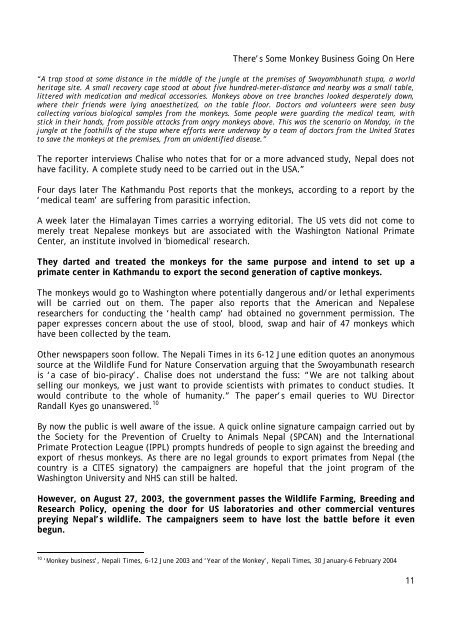Stop Monkey Business Campaign Report - Get a Free Blog
Stop Monkey Business Campaign Report - Get a Free Blog
Stop Monkey Business Campaign Report - Get a Free Blog
You also want an ePaper? Increase the reach of your titles
YUMPU automatically turns print PDFs into web optimized ePapers that Google loves.
There’s Some <strong>Monkey</strong> <strong>Business</strong> Going On Here<br />
“A trap stood at some distance in the middle of the jungle at the premises of Swoyambhunath stupa, a world<br />
heritage site. A small recovery cage stood at about five hundred-meter-distance and nearby was a small table,<br />
littered with medication and medical accessories. <strong>Monkey</strong>s above on tree branches looked desperately down,<br />
where their friends were lying anaesthetized, on the table floor. Doctors and volunteers were seen busy<br />
collecting various biological samples from the monkeys. Some people were guarding the medical team, with<br />
stick in their hands, from possible attacks from angry monkeys above. This was the scenario on Monday, in the<br />
jungle at the foothills of the stupa where efforts were underway by a team of doctors from the United States<br />
to save the monkeys at the premises, from an unidentified disease.”<br />
The reporter interviews Chalise who notes that for or a more advanced study, Nepal does not<br />
have facility. A complete study need to be carried out in the USA.”<br />
Four days later The Kathmandu Post reports that the monkeys, according to a report by the<br />
‘medical team’ are suffering from parasitic infection.<br />
A week later the Himalayan Times carries a worrying editorial. The US vets did not come to<br />
merely treat Nepalese monkeys but are associated with the Washington National Primate<br />
Center, an institute involved in 'biomedical' research.<br />
They darted and treated the monkeys for the same purpose and intend to set up a<br />
primate center in Kathmandu to export the second generation of captive monkeys.<br />
The monkeys would go to Washington where potentially dangerous and/or lethal experiments<br />
will be carried out on them. The paper also reports that the American and Nepalese<br />
researchers for conducting the ‘health camp’ had obtained no government permission. The<br />
paper expresses concern about the use of stool, blood, swap and hair of 47 monkeys which<br />
have been collected by the team.<br />
Other newspapers soon follow. The Nepali Times in its 6-12 June edition quotes an anonymous<br />
source at the Wildlife Fund for Nature Conservation arguing that the Swoyambunath research<br />
is ‘a case of bio-piracy’. Chalise does not understand the fuss: “We are not talking about<br />
selling our monkeys, we just want to provide scientists with primates to conduct studies. It<br />
would contribute to the whole of humanity.” The paper’s email queries to WU Director<br />
Randall Kyes go unanswered. 10<br />
By now the public is well aware of the issue. A quick online signature campaign carried out by<br />
the Society for the Prevention of Cruelty to Animals Nepal (SPCAN) and the International<br />
Primate Protection League (IPPL) prompts hundreds of people to sign against the breeding and<br />
export of rhesus monkeys. As there are no legal grounds to export primates from Nepal (the<br />
country is a CITES signatory) the campaigners are hopeful that the joint program of the<br />
Washington University and NHS can still be halted.<br />
However, on August 27, 2003, the government passes the Wildlife Farming, Breeding and<br />
Research Policy, opening the door for US laboratories and other commercial ventures<br />
preying Nepal’s wildlife. The campaigners seem to have lost the battle before it even<br />
begun.<br />
10 ‘<strong>Monkey</strong> business’, Nepali Times, 6-12 June 2003 and ‘Year of the <strong>Monkey</strong>’, Nepali Times, 30 January-6 February 2004<br />
11


